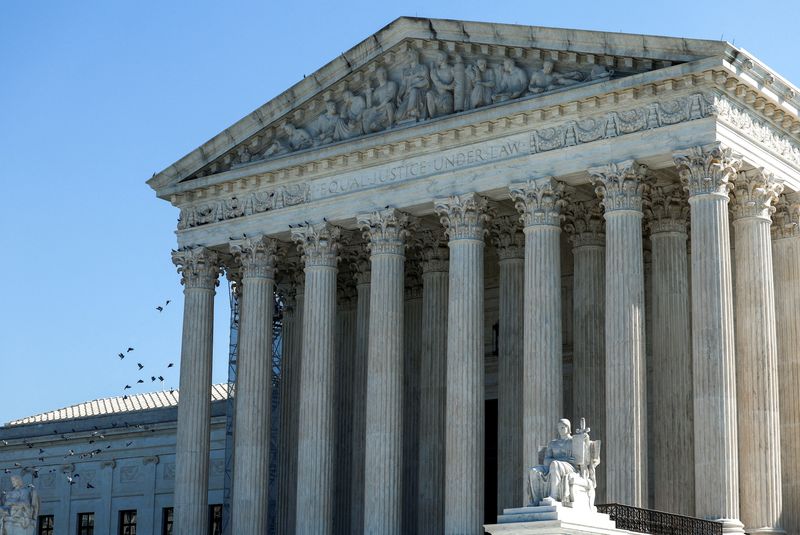[ad_1]

By Andrew Chung
(Reuters) – The U.S. Supreme Court docket declined on Tuesday to dam a Texas regulation requiring on-line age verification in an effort to entry pornographic web sites in a case pitting the Republican-led state’s effort to maintain grownup content material away from minors in opposition to constitutional free speech protections.
With no publicly famous dissents, the justices denied a request by a commerce group representing grownup leisure performers and different challengers to the regulation to placed on maintain a decrease courtroom’s ruling that the measure possible didn’t violate the U.S. Structure’s First Modification safeguards in opposition to authorities interference with freedom of speech.
The 2023 regulation requires any web sites whose content material is greater than a 3rd “sexual materials dangerous to minors” to require all customers, together with adults, to submit personally figuring out info verifying they’re a minimum of 18 years outdated to achieve entry. A number of different states have enacted related legal guidelines.
The Texas regulation’s challengers, represented by the American Civil Liberties Union and others, have stated that it poses safety and privateness considerations by exposing customers to potential id theft, monitoring and extortion. Additionally they stated that its effectiveness is undermined on condition that it might not prohibit social media or search engines like google and yahoo, the place pornography is rampant.
In any occasion, the challengers added, content-filtering software program works higher to guard minors than legal guidelines like this.
The plaintiffs contend that the case is simple given the Supreme Court docket’s personal precedents that deal with non-obscene sexual content material as constitutionally protected. These precedents permit governments to restrict entry by minors to sexual materials however, underneath the First Modification, they might not burden entry by adults to such content material.
take away adverts
.
Texas stated its regulation is critical as a result of smartphones have made it a lot simpler for youngsters to immediately entry “nearly limitless” hardcore pornography.
The regulation, Texas stated in a submitting, “merely requires the pornography trade that (makes) billions of {dollars} from peddling smut to take commercially affordable steps to make sure that those that entry the fabric are adults.”
The plaintiffs embrace the Free Speech Coalition, a commerce affiliation of grownup content material performers, producers and distributors, in addition to firms that run a number of pornographic web sites together with Pornhub.com and xnxx.com.
Senior U.S. District Choose David Alan Ezra issued a preliminary injunction in Austin blocking the regulation on the day earlier than it was set to take impact. Ezra famous that “constitutionally protected speech shall be chilled” and will sweep in non-porn web sites internet hosting R-rated films or intercourse training supplies for highschool college students.
The New Orleans-based fifth U.S. Circuit Court docket of Appeals allowed the regulation’s enforcement whereas it reviewed the case, and in March dominated that the plaintiffs had been unlikely to achieve their First Modification problem to the age verification requirement, lifting Ezra’s injunction on that provision.
The fifth Circuit upheld the choose’s injunction in opposition to a separate provision of the regulation requiring web sites to show “well being warnings” concerning the results of viewing pornography.
[ad_2]
Supply hyperlink









Leave a Reply